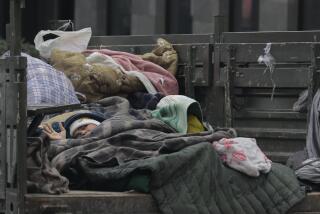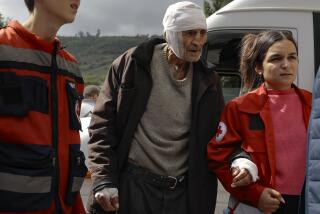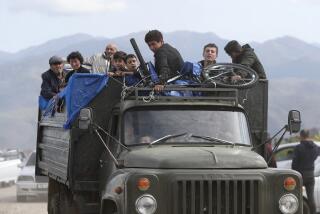Tension Eases in Contested Soviet Enclave
- Share via
MOSCOW — Tension eased Monday in the Soviet Union’s volatile Nagorno-Karabakh region as about 80% of the businesses and factories resumed operation with more employees expected to return to work today, government officials reported.
Workers had agreed over the weekend to call off a monthlong strike, which followed mass protests and other signs of unrest in the region. The strike was called to support demands to remove Nagorno-Karabakh, a largely Armenian region, from Azerbaijan and make it a part of the neighboring republic of Armenia.
Meanwhile, a senior Communist Party official in Moscow said the incompetence of two former regional party leaders was a major factor in the unrest. He said that until Monday, the authorities had been unable to defuse the situation.
“We didn’t have any definite results until today,” said Vyacheslav Mikhailov, deputy head of the Central Committee department that deals with ethnic questions. “It is a very difficult problem, involving emotions, but I think we will be able to resolve it and calm will prevail.”
The decision to end the strike was made at a rally in Stepanakert, the regional capital. Those urging an end to the strike said the move would symbolize support for Soviet leader Mikhail S. Gorbachev on the eve of a Communist Party conference here.
Opposition to Gorbachev
Gorbachev faces significant opposition to his program of sweeping economic and political liberalization, mainly from members of the party’s old guard who are worried about losing privileges, and about the potential dangers in loosening controls in a country where power has been wielded by the party elite.
The unrest in Nagorno-Karabakh is only one of several long-simmering ethnic disputes among the Soviet Union’s many nationalities that have emerged since Gorbachev’s decision to ease the traditional repression of political protest.
The disputes have provided powerful arguments for critics of Gorbachev, and Monday’s return to work in Nagorno-Karabakh is considered certain to boost his support.
Mikhailov, appearing at a news conference in Moscow, named the two incompetent leaders as Geidar A. Aliyev and Kyanmran M. Bagirov, both Azerbaijanis. He offered little in the way of elaboration but said that “much damage has been done, really grave damage.”
Aliyev governed Azerbaijan as head of the Communist Party there for 13 years before being brought to Moscow as deputy premier and a member of the Politburo in the final months of President Leonid I. Brezhnev’s regime.
One Resigned, Other Dismissed
Aliyev resigned last year from both posts, on grounds of ill health. Bagirov, who succeeded Aliyev as head of the Azerbaijan party, was dismissed last month as unrest increased in Nagorno-Karabakh.
He said the Armenians, who make up three-quarters of Nagorno-Karabakh’s total population, had been made to fear that their culture was in jeopardy from the Azerbaijani administration.
The Azerbaijanis are a Muslim Turkic people, and the Armenian people of Nagorno-Karabakh, who are Christian, contend that their culture has been neglected and that they have suffered religious discrimination.
Mikhailov noted that the central government has allocated about $800 million to preserve and develop Armenian culture in the troubled region and has provided equipment that enables residents to receive Armenian television programs.
More to Read
Sign up for Essential California
The most important California stories and recommendations in your inbox every morning.
You may occasionally receive promotional content from the Los Angeles Times.













